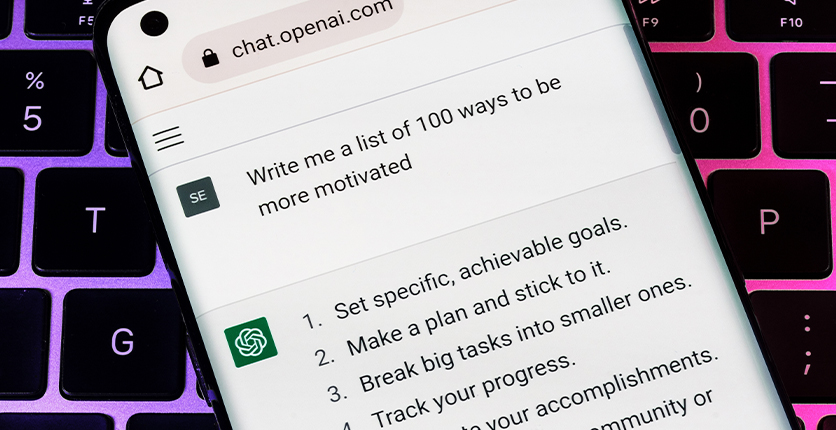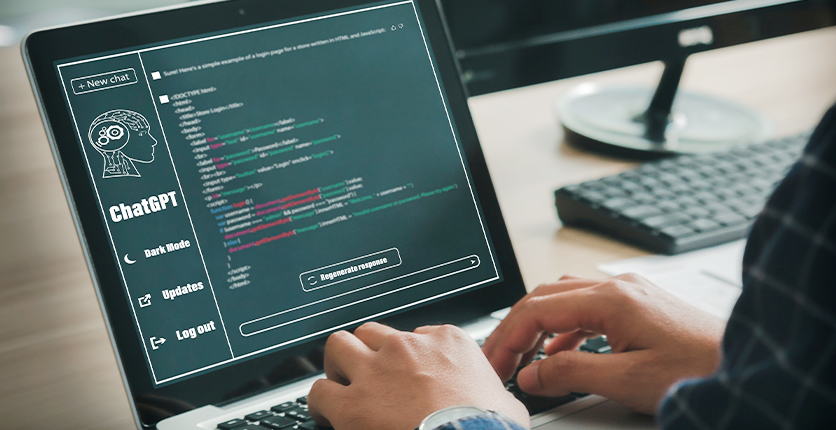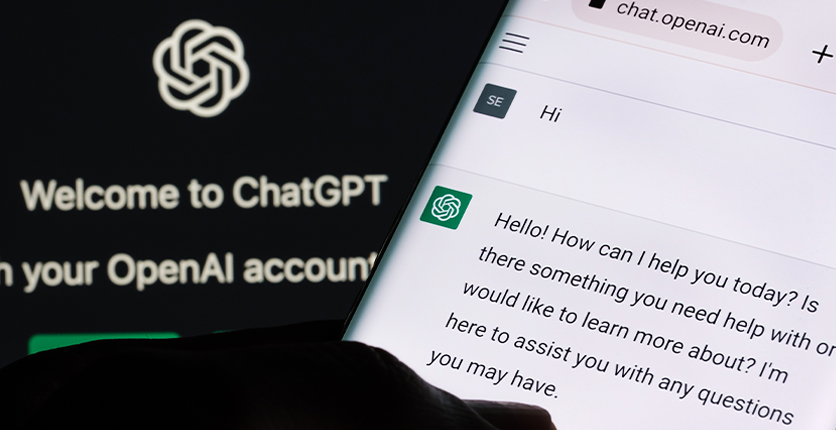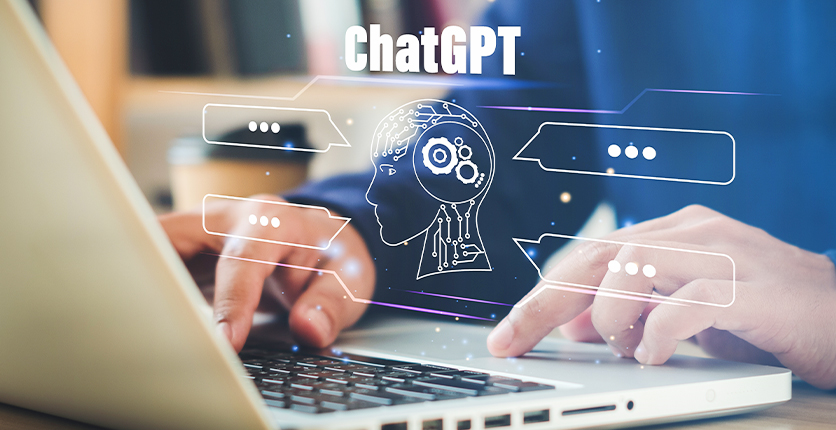We’ve been hearing a lot about chatbots lately. An artificial intelligence (AI) tool, chatbots are changing the way we interact with computers and retrieve information online. ChatGPT (Generative Pre-trained Transformer), in particular, has been causing a stir as it’s left many people concerned that it will replace certain jobs.
Launched in November 2022 by American AI research and deployment company OpenAI, ChatGPT is a long-form question-answering AI that can provide detailed and articulate, human-quality responses to all kinds of questions.
Now, there’s the super-advanced ChatGPT-4, which is said to be the most accurate, creative and collaborative version of the chatbot to date. Not only will it be able to read, process and discuss text; it’s been designed to handle pictures, too. Investment management and financial services company Morgan Stanley, payment company Stripe, and language-learning app DuoLingo are some of the organisations currently using ChatGPT-4 or testing it to see how it can help their business.
While ChatGPT has its advantages, many people fear that it will affect the job market and render many roles obsolete.
But there’s no reason to get alarmed just yet. We asked Ruchi Parekh, an Executive/Life Coach, and Dinu Dinesh, Manager for Tech & Transformation – Contract at Robert Walters Singapore, about what ChatGPT really means for jobs, and to share their ideas on how to use the AI tool to your advantage at work.

Q: What jobs or industries might benefit from the use of AI tools such as ChatGPT?
Dinu: Those working in data entry and market research; people in the media industry – for example, advertising executives, content creators, technical writers and journalists; those in the travel and education industries; and certain tech roles, such as coders and data analysts.
These industries and roles rely on data collection and the identification of trends and developments within that data. Qualities and skills like speed and accuracy, attention to detail, research and organisation, mathematical skills, language proficiency, creativity and writing, and analytical skills are pivotal to the success of these jobs.
ChatGPT is also capable of generating human-like texts. ChatGPT can create enormous opportunities for these industries as they leverage this technology strategically. Chat-based AI can enhance how humans work by automating repetitive tasks while providing more engaging interactions with users.
However, AI won’t fully be able to automate these jobs since it requires a certain amount of human judgement to understand what a client or end user wants.

Q: What are some of the main advantages to using ChatGPT in our work or business?
Dinu: Here are some ways ChatGPT can help you succeed in business:
Job listing and training: ChatGPT can help you find the best talent for your company. With an impressive search engine and database of over several million candidates, it can help businesses identify and hire the best talent.
Similarly, ChatGPT can also help companies create training materials for various products and services.
Quick market research: For any business to do well, market research is crucial. From setting up the business to ensuring that it flourishes over time, market research is the key to success. ChatGPT seems to be a game changer in this domain. Chatbots and virtual assistants can help analyse and abridge large amounts of data and offer insights into the target audience to help companies chart their marketing strategies.
By automating repetitive tasks such as emailing candidates or sending reminders to interviewees that would normally require human input, ChatGPT can also save you time and money.
Stay ahead in your career with regular upskilling – find out how here.

Q: How do you think these AI tools will change the tech industry, in particular?
Ruchi: I believe the tech industry will benefit most from AI tools. ChatGPT has already attracted the attention of tech giants like Amazon Web Services (AWS), Google Cloud and Microsoft, for instance.
While various tech companies have been working on AI for years, the combination of more data, better computing, and advancements in the AI field have helped generate information and content very close to human interaction. The newest version of ChatGPT can, in some cases, demonstrate “human-level performance”, according to the company behind it.
ChatGPT can be used to generate code, and write songs and even research grants. The new version will not only be able to process text but also images, and produce more complex content such as legal complaints and video games. Additionally, it can be used as a multi-pronged search engine optimisation tool for businesses.
But it’s important to remember that AI tools like ChatGPT will still depend on people to verify their results. So, for now, at least, human beings still have an edge over them.

Q: How might an over-reliance on ChatGPT to solve dilemmas affect our own problem-solving and critical thinking skills?
Ruchi: Relying on it to provide solutions to real-life problems and allowing it to think for us may reduce our ability to analyse information, think critically and solve problems independently.
While it can provide answers to specific questions, AI cannot guide us through the thought process required to arrive at those answers. Its algorithms are based on patterns and probabilities and it cannot understand the nuances of language, culture and context. As a result, the answers may end up being misleading.
Moreover, AI tools lack emotional intelligence due to their being based on logic. Over-reliance on AI by employees and management could create a sterile and uninviting environment, especially when someone needs emotional support and guidance from managers and leaders.
It may also lead to a reduced ability to face new challenges in an ever-evolving work environment.

Q: Could an over-reliance on ChatGPT affect our workplace communication skills?
Dinu: Human emotions do not play a role in the use of AI. So, if we rely too much on tools like ChatGPT to solve complex workplace problems involving people, we may end up with dispassionate solutions, and our ability to empathise with others may be impacted. By encouraging us not to think too deeply about our words, AI tools may change how we interact with others in the workplace. Our communications may end up being more focused on structure, and less on human compassion and consideration, such as being able to put ourselves in another person’s shoes.
Emotional Intelligence – or EI – is just as, if not more important than AI. Read more on why EI is crucial in the workplace.

Q: What are some other limitations of using ChatGPT in the workplace?
Ruchi: ChatGPT is fast becoming the “go-to” place to obtain information. This somehow implies that the responses it gives are always the best. But if we use ChatGPT to do all our work for us, we may become complacent.
Ordinarily, if we have a query about something or want to learn about a topic, we would typically discuss it with our colleagues, access different offline and online resources or compare different viewpoints. This makes the learning process interesting and educational, and also allows for the retention of facts, which may be important for subsequent queries and learning journeys. With ChatGPT, this process is lost.
AI tools may also inadvertently change our behaviour and thinking, and limit creativity and original content generation.

Q: How do we embrace AI tools like ChatGPT at work without becoming too dependent on them?
Ruchi: ChatGPT and other AI tools are certainly the way forward, and it doesn’t hurt to combine their usage in a sensible way with current styles of information gathering and decision making. Accepting them as part of our new reality is probably the best way forward. Blaming them for taking over our jobs, reducing motivation or limiting our perspective is taking the short-sighted approach.
We have all had to embrace different technologies over the years. These were frowned upon initially, but now they’re a part of our everyday lives – for example, the arrival of computers made clerical jobs and typewriters redundant but their benefits overrode everything.
Want more articles like this, and other lifestyle content right in your inbox? Download the new SAFRA mobile app and opt in for the eNSman Newsletter – you don’t need to be a SAFRA member to subscribe – and never miss another story!











